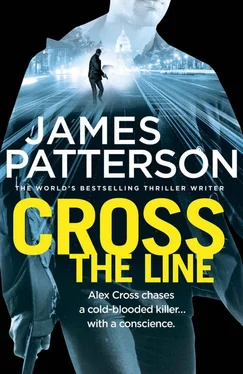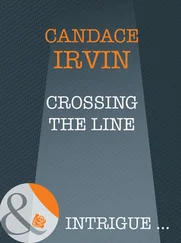Katya’s face clouded. “He is the one who killed her?”
“No, he died with her. Thomas McGrath.”
“Tommy?” Katya said, her face clouding further. “Yes, Edita tells me about Tommy. Too much about Tommy.”
Edita had met McGrath when he’d come to speak at her criminal law class. She was ten years older than the other students, and he was funny and handsome, and his wife had recently thrown him out of the house and said she didn’t love him anymore. Edita and McGrath had had a drink after class and dinner the next night.
“They became lovers,” Katya said. “Edita was the happiest I have seen her. Ever. For a month, maybe.”
“Then what happened?”
Katya said McGrath ran a background check on Edita and discovered that the green card she had was fake, and there were no records in INS of an Edita Kravic applying for citizenship.
“They lie,” Katya said. “Bogrov and the others. They sell to Edita a lie.”
After discovering the forgery, Katya said, McGrath forced Edita to come clean and tell him everything. But the more she told him about the Phoenix Club, the more he wanted to know. Tommy asked Edita to break into the club’s computers and copy things for him.
Katya stopped talking and looked up angrily. “Tommy, he says he loves Edita, but she has to prove she loves him. So he pushes and pushes, and she loves him, but she is so scared the last time I saw her. Tommy would not listen to her about Bogrov and Stavros, how they are bad men, crazy men. You ask me, Tommy got my Edita killed, and Tommy, he got himself killed too.”
Part Five
A Blimp Runneth
The sun was setting as John Brown ended his briefing with a description of that evening’s goal and the plan beyond it.
Brown looked around at the fifteen men and women in his living room, seeing mild shock in some faces, profound concern in others. He understood. His plan was bold and audacious, so audacious that—
“It’s insane,” Hobbes said, arms crossed.
Fender said, “We’ll be either shot or hanged.”
“You knew from the get-go what this was,” Brown said coldly. “Wasn’t it you, Hobbes, who said people would have to clean house to make way for the revolution in this country?”
“I did, but—”
“But nothing. You’re in this to clean house and see the revolution sparked or you’re not in this at all. Fender, you also agreed with that strategy. Or am I wrong?”
Hobbes squirmed in his chair, said nothing. Fender glared at Brown.
Brown was about to ask the room for a vote when Cass said, “Shit.”
He looked over at her, saw her staring at the muted TV tuned to CNN. Special Agent Ned Mahoney was walking toward a bank of microphones with the big FBI emblem on the wall behind them. Low on the screen, the banner read FBI Raids Sex Club Believed Linked to Vigilante Killings.
“Turn that up,” Brown said sharply.
Cass grabbed the remote and punched off the mute. They heard Mahoney say, “I’ll get to the Phoenix Club in Vienna, Virginia, but first we’d like to release two photographs of people we believe are part of the vigilante group.”
The screen split in two, and images appeared of Hobbes and Cass without their hoods inside the late Antonin Guryev’s house on Mobjack Bay.
“Mother of God, we’re screwed,” Fender said, seething.
Hobbes and Cass had both gone pale and stony.
The screen returned to Special Agent Mahoney, who said, “As of now, the woman’s name is unknown. But the man is Lester Hobbes, a mercenary and an assassin. We are asking anyone who has any information on Hobbes or this woman to come forward and help us locate them.”
“How do you know Hobbes and the woman are part of the vigilantes?” a reporter shouted.
Mahoney said, “Elena Guryev used her iPhone to video the feeds of several security cameras in her house during the attack.”
That set off a frenzy among the reporters, all of them asking where Mrs. Guryev was.
The FBI agent turned stoic and reserved. “Gunmen broke into an FBI safe house this morning and killed four of my best men. They also severely wounded a DEA agent and shot Mrs. Guryev to death, leaving her deaf son an orphan. And, yes, we believe the gunmen were associated with the vigilantes, or the Regulators, as they evidently call themselves. Turning to the raid in Virginia—”
Fender grabbed the remote, punched mute. “Regulators?” he said, looking around the room. “How did they know that? Who used—”
“Doesn’t matter,” Hobbes said, looking at Cass. “We’re done.”
“ The both of you did us all in,” Fender said, getting to his feet and looking like he wanted to smash things. “Taking off your hoods. Breaking the rules of engagement. What the hell’s with that?”
The room around Brown erupted with accusations and demands.
Brown stood up and roared, “Enough!”
The fifteen Regulators shut up, all of them red-faced and panting.
“It’s done,” Brown said sharply. “They’re coming after us. You knew they would eventually. So it’s done. What are you going to do about it? Are you going to turn on each other? Are you going to run? Or are you going to fight back, show some spine, believe in a better tomorrow created by your sacrifices and mine?”
He let that sink in for a while and then said, “Show of hands. Who’s with me?”
After several moments, hands began to go up, thirteen of them, including Cass’s. Fender remained livid but eventually raised his hand. Finally, Hobbes did too.
The television screen had switched from the FBI press conference to the weather forecast.
Brown grabbed the remote, turned the sound back on, and watched the forecast. The National Weather Service was calling for gale-force winds overnight.
“There, some good news for once,” Brown said. “Couldn’t be better. Get your gear strapped down, and your heads screwed on straight. We go at twenty-one hundred hours.”
Nana Mama was cooking pancakes for Ali the next morning when I came downstairs.
“Pancakes?” I said, rubbing Ali’s head. “What did you do right this time?”
“He put that letter to Dr. deGrasse Tyson in an envelope,” my grandmother said, gesturing at a stamped, addressed envelope on the counter. “In my book, seeing things through is cause for pancakes and real maple syrup.”
Ali grinned as she set a plate before him. “You think he’ll answer me?”
“You never know until you try,” I said. “Where’s Bree?”
“Up and long gone,” Nana Mama said. “She’s got a pile of paperwork to plow through and wanted to get at it. You hungry?”
“Tempting, but I think I’ll skip the—”
“Hey, Dad, look!” Ali cried, pointing to the little TV on the counter.
I glanced over and saw the bizarre image of a bearded driver in an Amish buggy looking up at a low-flying, pale white blimp that was dragging a thick steel cable more than a mile long across fields and through trees.
The newscaster said that sometime during the night the blimp had broken free of its mooring at the U.S. Army’s Aberdeen Proving Ground in Maryland, where the military tested everything from cannon rounds to chemical weapons. The blimp was part of a top secret over-the-horizon surveil-lance system currently being evaluated. The army believed the blimp’s cable had snapped due to gale-force winds that had struck coastal Maryland overnight.
“I’ve seen that thing,” I said. “The blimp. A couple of times last week from the Eastern Shore.”
The newscaster said the heavy cable had already damaged multiple high-tension lines and several homes and buildings. The army had crews trailing the blimp and trying to figure out how to bring it down safely.
Читать дальше












